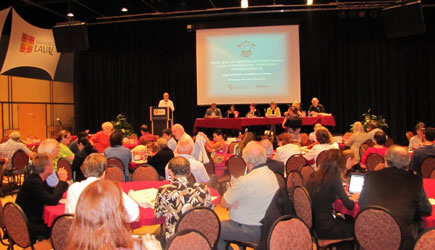1. Backlash builds as for-profits rake in money from military vet benefits
http://www.latimes.com/news/nationworld/nation/la-na-vets-colleges-20120716,0,2523844.story
2. More on the Columbia College, Chicago, NLRB decision
http://chronicle.com/article/Columbia-College-Chicago/132979/
and http://www.insidehighered.com/quicktakes/2012/07/19/nlrb-columbia-college-chicago-violated-labor-law
and (with a few errors)
http://www.suntimes.com/business/13859338-420/nlrb-orders-columbia-college-to-resume-bargaining-with-union.html
and http://www.chicagoreader.com/Bleader/archives/2012/07/23/columbia-college-adjuncts-claim-a-victory-at-the-nlrb
3. More on the Georgia unemployment insurance fight for contracted out workers in educational institutions
http://www.aflcio.org/Blog/Organizing-Bargaining/Unions-and-Community-Groups-Launch-Justice-for-School-Workers-Campaign-in-Georgia
4. For everyone going to COCAL X in Mexico and other interested in what our colleagues there are facing, here is an article on Carlos Slim (and much more), the world’s richest man and a Mexican.
http://truth-out.org/news/item/10309-the-1-connection-mexico-and-the-united-states-crony-capitalism-and-the-exploitation-of-labor-through-nafta
5. Good story out of Chicago Reader on how Mayor Emanuel and Mitt Romney have the same education program and why (and Obama too). It also makes very clear why we need to support the Chicago Teachers Union as much as possible in their fight to preserve public education in Chicago and nationally.
http://www.chicagoreader.com/chicago/romneys-plan-for-schools-sounds-like-rahms/Content?oid=6860548
and a Labor Notes article on the same issue
http://labornotes.org/2012/07/saying-its-not-about-money-chicago-teachers-inch-closer-strike
6. Florida adjunct wins case to know name of student complainant whose complaint led to his nonrenewal
http://www.insidehighered.com/news/2012/07/20/adjunct-wins-right-learn-name-student-critic
and http://www.adjunctnation.com/?p=4487
7. NYT on the future of unions
http://www.nytimes.com/2012/07/18/business/economy/unions-past-may-hold-key-to-their-future.html?emc=eta1
8. Another win at a for-profit language school in Vancouver, Inlingua ESL College. see below
9. A fine video of the students demonstrating in Quebec
https://www.youtube.com/watch?v=4KJ9lHdpsJU&feature=youtu.be
10. Brief filed on both sides with NLRB on grad student unionization issue
http://www.insidehighered.com/news/2012/07/24/organized-labor-and-higher-education-line-opposite-sides-grad-union-issue
11. Report from participant in Kaplan NYC organizing. see below
12. News Corp. (Rupert Murdoch, phone hacking et al) now heavy into K-12 education. Will higher ed be next? see below
13. Petition for better pay for adjuncts
http://signon.org/sign/better-pay-for-adjuncts.fb1?source=s.em.cr&r_by=160722&mailing_id=5212
14. Article on Ivy Tech (the statewide CC in IN), one of the worst abusers of PT and contingent faculty (no tenure for anyone, even FT senior faculty) in the nation
http://www.greenfieldreporter.com/view/story/e16bd3e57feb4d538889f425dc3fa82e/IN–Exchange-Temporary-Teachers
and http://posttrib.suntimes.com/news/14017026-418/rising-use-of-part-time-college-faculty-sparks-worries.html
15. Chicago teachers show mobilization and real strike threat can win, but fight and strike prep continues
http://labornotes.org/blogs/2012/07/chicago-teachers-win-relief-longer-day-battle-war-not-over
16. Budget constraints hitting contingent faculty in Iowa
http://www.iowastatedaily.com/news/article_0bfbf1be-d724-11e1-8988-001a4bcf887a.html
Updates in full
8. Afternoon
Commentary from FPSE President Cindy Oliver on another recent successful union certification in the private language training field in Vancouver. She also is calling for reform of the basic labour law as well.
Frank Cosco
FPSE and Vancouver Community College FA
From: Federation of Post-Secondary Educators [mailto:info@fpse.ca]
Sent: Monday, July 23, 2012 1:53 PM
To: Frank Cosco
Subject: [FPSE President’s Comment] Union drive at private college shows need for labour law reforms
JULY 23, 2012
www.fpse.ca
Union drive at private college shows need for labour law reforms
The news that the 40 faculty at Inlingua ESL College have been certified by the BC Labour Relations Board is great news all-around. For the faculty members, it’s a great step forward, one that will put them on a sound footing and a more respectful relationship with their employer. For the Organizing Committee at Education Training Employees Association (ETEA), Local 21, the news is another example of how hard work and dedication to organizing can make a real difference in the lives of faculty and staff in BC’s private post-secondary institutions. For FPSE, the successful organizing drive shows how the plan adopted at our May 2012 convention to put staff, legal resources as well as targeted funding to support Local 21’s work in this area is succeeding.
However, like previous organizing efforts in private post-secondary institutions, the experience at Inlingua ESL shows that BC’s labour laws are in need of major reforms. Despite a ruling by the Supreme Court of Canada in 2007 in which the Court noted that collective bargaining is an integral right for every worker, the laws that define those rights in BC tilt heavily in favour of employers, to the detriment of workers in this province.
BC law requires that even though a majority of workers at a workplace demonstrate—through the signing of union cards—that they want to unionize, they must submit to a government supervised vote before the union certification is granted. During the ten day period between when the certification notice is filed and the vote takes place, the employer is able to meet with workers and talk about the union drive. It’s an intimidating time for every worker. In effect, BC’s Labour Code gives an employer one last chance to undermine the organizing effort. In the case of Inlingua and other private colleges that have unionized in the last few years, the employer pressure tactics have not worked.
But workers shouldn’t have to endure that kind of pressure. That’s one of the reasons why unions like FPSE are making the case for much needed reforms to BC’s labour laws. Unionizing is a decision for workers to make. Allowing employers to interfere with that decision only serves to undermine a balanced labour-management relationship that needs to be in place from the beginning.
Keep in mind too that once the union certification is granted, the process of negotiating a first collective agreement can often be just as challenging as the initial organizing drive. Employers who are steadfastly opposed to unionizing have found ways to make the first agreement process protracted and frustrating, conditions that are designed to undermine free collective bargaining and effectively neutralize the effort to establish fair first agreements.
There is an urgent need for labour law reforms in this area as well. Prior to 2002, there were mechanisms in place to help move new certifications towards a mediated first agreement. Those measures were removed by the BC Liberals, giving employers additional tools to fight organizing drives.
BC needs to restore balance to its labour laws, balance that reflects the principles supported by Canada’s Supreme Court when it comes to collective bargaining. The experience of private post-secondary faculty organizing efforts shows how the current Labour Code fails to protect those principles and, ultimately, fails to respect the right we all have to free collective bargaining.
You are subscribed to fpsenews as Frank Cosco .
To unsubscribe, send a blank email to:
leave-fpsenews-5738P@list.fpse.ca
Federation of Post-Secondary Educators of BC
400 – 550 West 6th Avenue, Vancouver, BC V5Z 1A1 | Telephone: 604.873.8988 | Fax: 604.873.8865
Email: info@fpse.ca | CUPE 1004
_______________________________________________
adj-l mailing list
adj-l@adj-l.org
http://adj-l.org/mailman/listinfo/adj-l_adj-l.org
—————
11.
Sent to you by Vanessa via Google Reader:
The Unionization Process
via Teachers for a Better Kaplan by Those in favor on 7/18/12
The following is one KIC teacher’s recount of the process of unionizing our three centers in New York:
I’ve been a teacher at Kaplan for a few years and there have always been discussions about unionization. In the fall of last year a few fellow teachers and I got together for drinks and discussed the main reasons why it would be good to join a union. We contacted the union for the Washington Post first since it is the parent company of Kaplan. They are in DC, so they put us in touch with the folks at The Newspaper Guild in NYC. It took about 2 months to schedule our first meeting at the union.
There are three schools in NYC so before the first meeting we tried to get in touch with teachers from the other schools. This was a bit of a challenge because we couldn’t just send a blanket email and ask who was pro-union. Luckily, we got in touch with someone, who got in touch with someone else, and were able to get at least one or two from each school at the first meeting.
The purpose of the first meeting was to explain who we were, to find out about the process of unionization, and to learn more about the role of the union. Although many of us had been in or connected with a union in the past, none had gone through the initial process of unionizing before. At that first meeting, we were encouraged to seek out other unions to see what they had to offer. We did some research and even had meetings with other unions, but in the end voted 7-1 to go with the Guild.
Our aim was not to install the union through our small group, but to get to the point of having a school-wide vote on whether or not we should have a union. The vote is monitored by the NLRB (National Labor Relations Board). In order to signify to the NLRB that our group was interested in having a vote, we had to get 60% of our coworkers to sign union cards. The card is a printed index card with basic info: name, date, address, title, signature, etc. Actually, we only needed 30% or 35% to take this step legally, but it is safer to go forward with a vote when there is at least 60% of the people demonstrating interest.
The importance of secrecy may seem obvious, but I didn’t realize how key it was before the first meeting. It was essential that management didn’t know what we were doing. Initial discussions had to be held outside of the workplace. Even if managers seemed to be pro-union, it was best that they don’t know because it could have put them in an awkward place of having to lie at some point.
Secrecy can be construed as sneakiness; in fact, it is just being necessarily strategic. Unfortunately, because we had to be quiet about our discussions, the atmosphere at work became intensely uncomfortable. While we were collecting signatures, we didn’t know whether those involved in organizing would be fired for leading the drive. We didn’t want to talk to people who we knew or thought were anti-union because they of course might have informed management about what was happening. Basically, we had to gauge each person individually before asking them to sign a card.
It helped that I had worked there for a while already because I knew most of the teachers at my school. We made it easier by dividing the task among a few teachers, so we each had to talk to not more than 5-6 others. We couldn’t give the cards out and have them returned later, but rather had to sit with the signer and be sure the card didn’t end up left on a table somewhere. Sometimes I just invited someone out to coffee to make it easier to talk freely. While telling people about the process, we were clear that the goal was to have a vote. Even though we weren’t able to talk to everyone initially, nothing would have been decided without everyone having a chance to put in his or her opinion. I also tried to focus on the issues. People generally have similar problems with the workplace, and it was important to not lose sight of the fact that we were doing this in hope of making our lives a little better.
The secrecy did freak some people out. It’s easy to feel like there is something nefarious going on when people are not being open about what they are doing. We just had to hope that eventually others would understand why it had to be that way. Like I said, one of the main reasons for secrecy was because we were worried that people would be fired. It is illegal to fire someone for being involved with unionization, but what would stop them from firing people for other reasons? We also knew that once management learned what was going on they would begin an anti-union campaign.
Management did find out but not until we had gotten signatures from nearly 50% of the teachers. It was important that we had worked fast and spoken to as many people as possible in a short amount of time. Because Kaplan is probably on the lookout for union activity in other schools, it may be even more difficult now to get past this beginning stage.
Kaplan began the retaliation by holding mandatory meetings during breaks and even pulling people aside individually to give them “helpful” information about why unions were bad. Many people saw that the fliers were poorly written propaganda pieces meant to intimidate, but I’m sure others were swayed, at least to want to stay out of the whole thing altogether. We knew that regardless of their real opinions, our direct supervisors had to tow the company line in order to preserve their own positions. I think some teachers were afraid of losing the respect of and camaraderie with their supervisors if they went against what they were saying.
At some point one of the teachers at one of the schools came across some papers that our supervisors were given by upper management about how to recognize signs of unionization and how to talk to teachers about the process. There were notes taken about everything that everyone said during the meetings. Our managers were instructed to look out for groups of teachers who were having private conversations, among other things.I’m pretty sure they were roaming the hallways a lot more than usual during that time. I have to say, it was one of the most stressful few weeks I have ever experienced. In theory, I wasn’t that afraid of losing my job, which was really the worst that could have happened, but the psychological pressure that Kaplan put on us was so great that I dreaded coming to work every day. This dread, however, only made me more resolute in my belief that we needed a union.
In the end, we did reach very near our goal of having 60% of teachers sign cards to signify to the NLRB our wish to have a vote. With that, the cards were submitted, Kaplan was officially notified (at that point still not knowing that we were already so far along), and a vote was scheduled for a month down the line in June.
After that, the meetings continued to go on and on and people got more and more heated in their discussions. I don’t know what Kaplan thought they were doing, but much of their anti-union campaign just seemed to push people like me further along the road to unionization. There is a fairly good record of some of the fliers they were putting out on the teacher’s blog. Have a look for a laugh! Some teachers, on the other hand, became vehemently anti-union. This was most difficult to deal with because we wished that we could just have calm discussions to share our opinions but emotions were too high to do so. Without rational discussions, it was hard to give important information or to clear up misinformation. Once people decided they were anti-union, it was tough to convince them to go to meetings that weren’t being led and controlled by Kaplan.
In the beginning of June, the NLRB set up voting booths in each of the schools and each teacher was able to vote anonymously. I believe that nearly all eligible teachers voted. The count was 2-1 in favor of the union. We are now in the process of electing officers who will be helping the Guild put together a survey to see what issues are most important to all teachers. What we aim to bargain for in our first contract will also be decided by all of the teachers democratically. Once this information has been gathered, a bargaining committee consisting of several teachers from each school will sit down with Kaplan and Guild lawyers and representatives and physically negotiate a contract.
While I personally enjoy my work at Kaplan, I feel the company has cut so many corners that it severely compromises the quality of education it can provide and the quality of life that teachers lead while working there. The union never promised that we will get anything. They offer help in negotiating a contract that provides us with improved working conditions. It is my hope that Kaplan can begin to view the teachers not as adversaries who need to be outwitted of dollars and cents, but as responsible workers providing valuable input on the creation of a sustainable and healthy system.
Things you can do from here:
• Subscribe to Teachers for a Better Kaplan using Google Reader
• Get started using Google Reader to easily keep up with all your favorite sites
_______________________________________________
adj-l mailing list
adj-l@adj-l.org
http://adj-l.org/mailman/listinfo/adj-l_adj-l.org
——————-
12. Education Week today published an article on News Corp’s move into K-12 education which lays out the Murdoch / Klein overall plan, of which partnering with AT&T around “interactive curricula” for tablet computers is just one aspect. As would be expected, News Corp plans to jump into the $1 trillion / year K-12 for-profit market whole hog.
“In talking with schools, News Corp.’s name rarely comes up, Berger said, owing to the distance between education and the phone-hacking scandal. Though Wireless Generation did lose a $27 million contract in 2011 with New York State, and in a May interview with The New York Times Michael Mulgrew, president of the United Federation of Teachers, asked “What parent would want personal information about themselves and their children in the hands of Rupert Murdoch, given the current circumstances?”
News Corp. Ed. Division Moves Into K-12 Curriculum
By Jason Tomassini on July 23, 2012 3:00 PM | 3 Comments
UPDATED
Global media conglomerate News Corporation jump-started its fledgling—and mostly quiet—education division today, unveiling Amplify, a new brand for its education business that will include education software products and, in a surprising move, curriculum development.
The re-branded division will include three initial focuses, beginning with pilot programs during the upcoming school year:
• assessment and data analysis, mostly through Wireless Generation, the software company News Corp. purchased a majority stake of in 2010;
• a tablet-based digital learning platform that will customize content, assessments, and course materials to each student using performance data and will be delivered, at least initially, through a partnership with AT&T;
• English language arts, science, and math curriculum, adapted to the Common Core State Standards. The content will be licensed from other publishers or written by Amplify in-house and combine text, interactive elements, and assessments to adapt to individual students.
“It’s both a branding exercise, but beyond that it’s an introduction to our vision and where we’re going,” Joel I. Klein, the head of the education division whose new title is Chief Executive Officer of Amplify, said in an interview.
While the assessment tools have been Wireless Generation’s bread-and-butter for several years, the tablet platform and curriculum development marks a new direction for News Corp., one that places it in competition with giant education companies such as Pearson and McGraw-Hill, rather than just education-software providers.
While Klein wouldn’t mention any competitors by name, it’s clear that Amplify, like those larger companies, intends to offer a complete range of services: curriculum content, the technology platforms through which it is distributed, and the tools that allow students and teachers to get more out of it.
For its move into curriculum, Amplify will partner with publishers such as Lapham’s Quarterly and Lawrence Hall of Science at the University of California-Berkeley, and develop its own content through Wireless Generation. The content will be digital and interactive, but Klein suggested some would be distributed digitally in the early going.
Amplify’s tablet platform will be made available on devices powered by AT&T broadband and wireless networks. The Associated Press reports the schools won’t have to pay to participate in the pilot program but more information on school selection and how the product will end up in classrooms will be released soon, according to Amplify’s website.
Larry Berger, co-founder and executive chairman of Wireless Generation, said in an intervierw that News Corp.’s investment in curriculum is among the largest he’s seen during his 20-year career, though Berger would not disclose the monetary value of that investment. Klein told the Wall Street Journal that News Corp.’s education division made $70 million in investments last year.
(Berger serves on the board of trustees of Editorial Projects in Education, the nonprofit corporation that publishes Education Week.)
Since being purchased by News Corp., Wireless Generation, which says it serves 3 million students in the United States, has grown from about 400 employees to 830 employees. There hasn’t been much news out of the education division during that time. Last year, Klein, the former New York City Schools Chancellor, was immediately thrust into a close advisory role to News Corp. chief executive Rupert Murdoch during the phone-hacking scandal that rocked News Corp.’s British newspaper division and the company.
When asked if Amplify would have been unveiled much earlier if not for the phone-hacking scandal, Klein scoffed. He said the company looked “thoroughly” into additional acquisitions in education but decided instead to develop products through, and invest in, Wireless Generation, which fueled its growth.
“There’s a difference between being in incubation mode and being in hiatus mode,” Berger said.
Since Klein re-focused all of his energy on education in mid-June, there have been major changes at the company. News Corp. recently decided to split into two companies, one for its lucrative film and television operations and another for its publishing business. Education will be part of the latter. Over the weekend, News Corp. chief executive Rupert Murdoch resigned his directorships of several British newspapers, setting off speculation that those assets may be sold.
In talking with schools, News Corp.’s name rarely comes up, Berger said, owing to the distance between education and the phone-hacking scandal. Though Wireless Generation did lose a $27 million contract in 2011 with New York State, and in a May interview with The New York Times Michael Mulgrew, president of the United Federation of Teachers, asked “What parent would want personal information about themselves and their children in the hands of Rupert Murdoch, given the current circumstances?”
Regardless of the real stink on the News Corp. name, Amplify should help further the education division’s distance.
Klein and Berger hinted at additional education deals in the future, but wouldn’t disclose more details. Both were adamant that the current education market isn’t serving schools’ digital learning needs and that Amplify’s products will “transform” and “reimagine” learning. This, of course, will require teachers, administrators, and most importantly, students to get on board, Klein acknowledged.
“If students don’t find it engaging, exciting and inspiring, it has very little value,” he said.
——————————————
Please use
510-527-5889 phone/fax
21 San Mateo Road,
Berkeley, CA 94707
“Access to Unemployment Insurance Benefits for Contingent Faculty”, by Berry, Stewart and Worthen, published by Chicago COCAL, 2008. Order from
“Reclaiming the Ivory Tower: Organizing Adjuncts to Change Higher Education”. by Joe Berry, from Monthly Review Press, 2005. Look at for full information, individual sales, bulk ordering discounts, or to invite me to speak at an event.
See Chicago Coalition of Contingent Academic Labor, for news, contacts and links related to non-tenure track, “precarious” faculty, and for back issues of the periodic news aggregator, COCAL Updates. Email joeberry@igc.org to be added to the list.
See for information on the Tenth (X) Conference on Contingent Academic Labor in Mexico City, August 10-12, 2012 at Univ. Nacional Auto. de Mexico (UNAM), Mexico City.
To join international COCAL listserve email If this presents problems, send an e-mail to vtirelli@aol.com
or, send “Subscribe” to


 Follow
Follow

